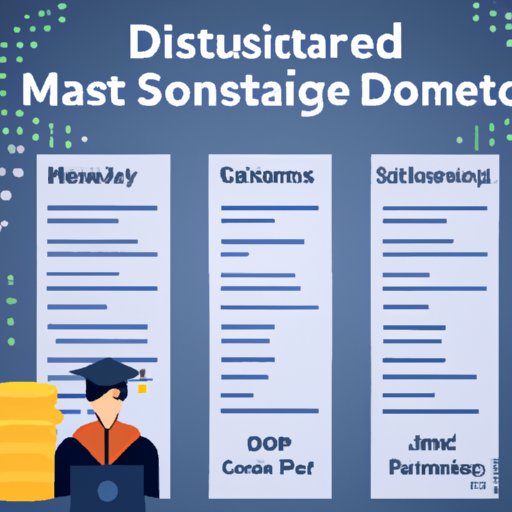Introduction
Data science has quickly become one of the most sought-after fields in the job market. With the rise of big data, businesses are increasingly looking for professionals who can analyze and interpret large datasets. As a result, individuals with advanced degrees in data science are in high demand. Pursuing a master’s degree in data science can be a great way to expand your knowledge and skills in this growing field. But how much does a master’s in data science cost? In this article, we will explore the cost of a master’s degree in data science, including tuition, fees, and other expenses. We will also look at different types of financial aid that can help make this degree more affordable.
An Overview of the Cost of Pursuing a Master’s in Data Science
The cost of pursuing a master’s degree in data science can vary significantly depending on the type of program, where you choose to study, and any financial aid you receive. Generally speaking, the average cost of tuition for a master’s degree in data science ranges from $7,000 to $50,000. Additionally, there are other costs such as textbooks, living expenses, and technology fees that should be taken into consideration when budgeting for your degree.
Breaking Down the Price Tag: Comparing Different Types of Master’s Programs in Data Science
When looking at the cost of a master’s degree in data science, one of the first things to consider is the type of program you choose. There are two main types of master’s programs in data science: online programs and traditional on-campus programs. Online programs tend to be less expensive due to their flexibility and lack of overhead costs. Traditional on-campus programs, on the other hand, typically have higher tuition costs that include additional fees for campus facilities and services. You should also consider whether you want to pursue a full-time or part-time program. Full-time programs usually cost more due to the accelerated nature of the coursework. Part-time programs, on the other hand, are often cheaper since they allow you to spread out the cost over a longer period of time.
Exploring Tuition Costs of a Master’s Degree in Data Science
The cost of tuition for a master’s degree in data science can vary significantly depending on a number of factors. One of the most important factors is whether you are attending an in-state or out-of-state school. In-state schools tend to have lower tuition rates than out-of-state schools. Other factors that can impact the cost of tuition include the reputation of the school, the length of the program, and the type of degree (e.g., master of science vs. master of engineering). Additionally, some schools may charge additional fees for certain courses or services.
Examining the Financial Aid Options for a Master’s in Data Science
Financial aid can help make a master’s degree in data science more affordable. One of the most common forms of financial aid is federal student loans. These loans are offered by the U.S. Department of Education and can cover up to 100% of the cost of tuition and other expenses. Additionally, there are a number of scholarships and grants available specifically for students pursuing a master’s degree in data science. Private loans are another option, though they typically have higher interest rates and are not always the best choice.
How to Find the Most Affordable Master’s Program in Data Science
When searching for the most affordable master’s program in data science, it’s important to shop around and compare different programs. Consider the cost of tuition and fees, as well as any additional expenses you may incur during your studies. Additionally, don’t forget to factor in any financial aid you may be eligible for. Finally, it’s important to remember that the lowest priced program isn’t always the best option. Look for programs that offer quality education and have good job placement rates.
What Are the Benefits of Investing in a Master’s Degree in Data Science?
Investing in a master’s degree in data science can provide numerous benefits. For starters, having a master’s degree in data science can open up a wider range of job opportunities. Many employers prefer to hire candidates with advanced degrees, and a master’s degree in data science can give you a competitive edge. Additionally, having a master’s degree in data science can lead to higher salaries. According to PayScale, those with a master’s degree in data science earn an average salary of $77,000. Finally, pursuing a master’s degree in data science can help you build valuable professional connections and networks.
Analyzing the Return on Investment for a Master’s in Data Science
When considering the cost of a master’s degree in data science, it’s important to take into account the potential return on investment. In the short term, earning a master’s degree in data science can lead to better job opportunities and higher salaries. Over the long term, having a master’s degree in data science can open up even more career paths, as well as the potential to start your own business or consultancy. Therefore, investing in a master’s degree in data science can be a sound financial decision.
Conclusion
In conclusion, a master’s degree in data science can be an invaluable asset for many professionals. While the cost of tuition for a master’s degree in data science can vary significantly, there are several options for making it more affordable. These include federal student loans, scholarships and grants, and private loans. Additionally, investing in a master’s degree in data science can provide numerous benefits, both in the short-term and long-term. Ultimately, the decision to pursue a master’s degree in data science should be based on an individual’s financial situation, goals, and career aspirations.
(Note: Is this article not meeting your expectations? Do you have knowledge or insights to share? Unlock new opportunities and expand your reach by joining our authors team. Click Registration to join us and share your expertise with our readers.)
